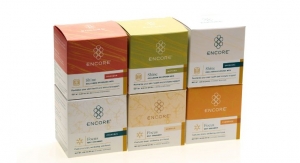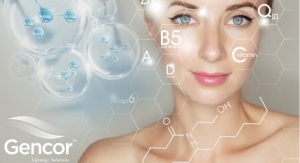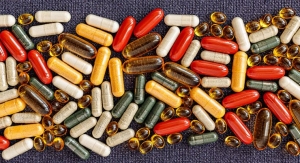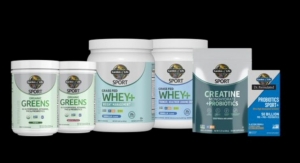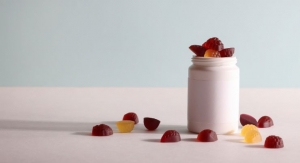Sean Moloughney, Editor06.01.16
With more consumers increasingly judicial about what they put into and onto their bodies, natural product solutions continue to gain share in both the nutrition and cosmetic markets.
The collision of these two categories has given rise to the wellness from within segment of dietary supplements and beverages. Designed to deliver beauty and healthy aging benefits with particular emphasis on skin, hair and nails, nutricosmetic sales (beauty supplements and tonics/beverages) reached $3.3 billion in global sales in 2015, according to Euromonitor International.
Asia-Pacific and Europe represent the largest share of sales, but analysts have suggested the U.S. may offer the greatest potential for growth. According to a recent report from Global Industry Analysts Inc. (GIA), the nutricosmetic market has been driven by a growing desire among consumers to prevent premature skin aging, along with a general preference for natural, safe and effective beauty solutions.
Increased consumer acceptance of the “beauty from within” concept will further help drive sales, particularly for ready-to-drink beverages and products that contain collagen. Market challenges include high prices of nutricosmetics, slow results—a key factor impeding acceptance among consumers—and a lack of awareness about potential skin health benefits that nutricosmetics may offer.
Primary Drivers
The market is primarily driven by women over age 35, yet younger women and more men are now spurring an evolution of the category, according to Sébastien Bornet, vice president of global sales and marketing at Switzerland-based Horphag Research (the exclusive worldwide supplier of Pycnogenol French maritime pine park extract).
“Market growth has recently been attributed to women in their 20s looking to take preventive measures for healthy aging,” he said. “We are also tracking an emerging conversation on skin nutrition and ‘skin fitness.’”
According to the NPD Group, 39% of women ages 25-34 say anti-aging is an important benefit they look for in facial skin care products. This is a significant jump from the 18-24 year old age group where only 19% of women feel anti-aging is important.
Women age 25-34 represent 18% of all facial skin care users in the U.S. and use an average of three facial skin care products in a day, with cleansers topping the list. Moisturizing/hydrating, acne prevention, and sun protection are the most important benefits they look for in a facial skin care product. Still learning about skin care in general, these women like to experiment with products, and do so more than any other age group, according to NPD.
Overall, 40% of Millennials take an active approach to skin health, according to a 2014 report from Datamonitor Consumer, which has since been purchased by market research firm Canadean.
Traditionally, topical skin care products such as lotions and creams have driven the U.S. beauty market. However, consumers are becoming more aware of and more interested in products that promote beauty from within, said Mr. Bornet. “There is a deeper understanding of the role nutrition plays in our skin; that means our skin reflects what we eat as well as what we apply externally. More consumers are seeking products with premium ingredients backed by scientific evidence to care for their skin.”
Golan Raz, vice president of health and nutrition at Lycored, Orange, NJ, said rapid growth of the nutricosmetics market complements topical cosmetics to improve skin’s longevity, health and beauty. “The ingestible skin care segment speaks to the importance of daily nutrition to support wellness and appearance of the skin.”
Traditionally, the target demographic has been women in the 30-60 range age range, who are aware of the importance of nutrition for well-being in general, and wellness of their skin in particular, he added. “Yet, we see a development in the sense of awareness to the role nutrition plays in our path to wellness among younger individuals all the way to teenagers. Also, there is a growing awareness among men who realize that skin’s longevity is the result of overall wellness and well-being.”
The nutricosmetics market can be segmented into three distinct categories, according to Mr. Raz. The sun (UV) protection segment has been most popular in France and other European countries, with growth accelerating in the U.S and Australia. The skin-whitening segment has been dominant in Asia, but a growing market is emerging in India and some Arab countries like the UAE, he said. And the ingestible skin care, beauty, cosmetics market has developed globally, with an overall rapid rise in awareness in the U.S., Europe and Asia.
A 2014 analysis from ReportsnReports indicated 72% of women buying natural/organic beauty products believe in the “beauty from within” concept.
Still, the main challenge to expanding the market further remains consumer awareness about the importance of nutrition for the skin’s health, longevity and beauty, Mr. Raz added. It’s important to consider that informing consumers today is a social effort, not just a commercial one. “While companies can advertise and sponsor a dialogue to a certain extent, it is the real desire of consumers to discuss this topic over existing channels that affects the growth in awareness more than anything else.”
Healthy ‘In Style’
A maturing and growing market, nutricosmetics that support the function, structure and wellness of the skin offer significant and broad appeal, according to Mr. Bornet.
“Healthy skin is always in style,” he said. “It’s become less about covering up our skin and more about how our skin can look better naturally. As we have gained more education on skin health, protection from the sun and environmental damage, and aging on our own terms, more consumers are seeking natural ingredients to care for their skin. And science shows us that some select ingredients can play a proven role in our skin health.”
A range of nutrients contribute to overall wellness and play a role in promoting healthy appearance of the skin, including: vitamins A, B, C and E; minerals such as chromium, copper, selenium and zinc; herbs/botanicals like aloe vera; as well as essential fatty acids, antioxidants/carotenoids, CoQ10, collagen and others.
“In general, a balanced diet of whole, unprocessed foods that is rich in whole grains, legumes, fruits, and vegetables will provide the necessary nutrients for healthy skin, hair, and nails,” said Jeanette Jacknin, MD, in her book Smart Medicine for Your Skin.
However, dietary supplementation and fortified foods and beverages continue to play a large role in complementing deficient diets.
Vitamin A is essential for the maintenance and repair of normal skin tissue and is a potent antioxidant that helps neutralize damaging free radicals. Vitamin C, or ascorbic acid, is essential for the manufacture of collagen, the protein that makes up cartilage, tendons and other connective tissue, including the skin. Vitamin C also protects cellular structures, including DNA, from damage, according to Dr. Jacknin. It protects against the harmful effects of pollution and increases immunity, consequently helping to guard against infection. There is also evidence suggesting vitamins C and E work synergistically, magnifying each other’s effects and together increasing antioxidant activity. Vitamin E scavenges for harmful oxygen radicals in the cell membranes, while vitamin C works in biologic fluids to attack free radicals, Dr. Jacknin noted.
Product & Research Trends
Natural extracts of whole fruits and vegetables, with advanced technologies on both standardization and delivery, will help to advance the nutricosmetics market, according to Mr. Raz.
“Research shows that there isn’t one active molecule that drives the positive affect, it is a collective effort that requires synergy and the right potency. Tomato extract, marigold extract, natural beta-carotene, grape fruit extract and other concentrated natural extractions are all beneficial for skin’s longevity and wellness.”
For example, Lycored’s Lycoderm contains a skin-grade tomato extract (the brand’s whole-food extract is standardized with the carotenoids lycopene, phytoene and phytofluene) and carnosic acid (extracted from rosemary leaves).
According to the company, the product protects the skin from DNA damage due to sun exposure; helps maintain the skin’s ability to protect against photoaging; increases skin smoothness, density and thickness; and helps prevent damage caused by sunlight.
Lycored is currently completing (Q3 2016) its largest skin longevity clinical trial, consisting of 180 participants in three centers in Europe. “Led by Professor Jean Krutmann from Dusseldorf University, the trial is one of the largest, most challenging clinical works performed in recent years,” according to Mr. Raz.
Research remains a point of differentiation in the marketplace of skeptical consumers who demand results. “The challenge ingredient manufacturers face is demonstrating efficacy in properly designed clinical studies and then conveying this information in a consumer friendly manner,” said Tim Hammond, vice president of sales and marketing, Bergstrom Nutrition, Vancouver, WA.
For many years OptiMSM, a leading brand of methylsulfonylmethane (MSM), has been regarded as a premier ingredient for supporting joint and connective tissue. It supports healthy joints by reducing inflammation and oxidative stress within the connective tissue, protecting it from further damage. The role OptiMSM plays in supporting the health of joint tissue led to interest in exploring its ability to support healthy skin, Mr. Hammond explained. “Studies have shown promising results in OptiMSM’s ability to lessen the signs of aging, improve skin hydration and tone, and reduce inflammatory skin ailments.”
The anti-inflammatory and anti-oxidative stress benefits of OptiMSM have been known for some time, according to Rod Benjamin, director of R&D and technical services for Bergstrom Nutrition.
“Studies have shown that it reduces pro-inflammatory cytokines TNF-alpha, IL-1 and IL-6, which are all associated with inflamed skin and known for damaging collagen. A possible mechanism for part of its anti-inflammatory effects is its ability to down-regulate NF-κβ, an upstream inflammatory molecule that can also be associated with inflamed skin.”
OptiMSM itself is not an antioxidant, but it helps support the body’s natural antioxidant pathways, said Mr. Benjamin. “Most notable is its ability to benefit levels of glutathione and critical enzymes associated with glutathione. This makes OptiMSM a great supplement to take in combination with true antioxidants like vitamin C.”
In 2015 researchers conducted a clinical trial with a gene regulation component to observe the effects of OptiMSM on lessening signs of aging skin, including wrinkles and lack of elasticity. The gene regulation component showed that OptiMSM regulates genes associated with skin barrier function and collagen production. Published in the Natural Medicine Journal, the double-blind clinical pilot study recruited 20 female participants to take either 3 grams of OptiMSM or a placebo each day for 16 weeks.
“Women taking OptiMSM found improvements to skin tone and a reduction in fine lines and wrinkles,” Mr. Benjamin reported. “Crow’s feet and skin firmness had statistically significant improvement when compared to the placebo. In the study, 100% of participants taking OptiMSM showed reduced number of wrinkles, with an average reduction of 38%. The results were measured through instrumentation, expert clinical graders, and perhaps most importantly through participant self-assessment.”
Pycnogenol, a standardized natural extract from French maritime pine bark, is widely used in oral applications for various skin care indications and supported by numerous independent, peer-reviewed and published studies, according to the company’s Mr. Bornet. Pycnogenol has four basic properties: 1) it’s a potent antioxidant; 2) it acts as a natural anti-inflammatory; 3) it selectively binds to collagen and elastin in the skin and increases regeneration of hyaluronic acid; and 4) it aids in the production of endothelial nitric oxide, which helps with skin’s micro-circulation.
A study conducted at the Leibniz Research Institute for Environmental Medicine (IUF) and published in Skin Pharmacology and Physiology in 2012 found that Pycnogenol: elevated new endogenous collagen production by increasing gene expression of COL1A1 by 29% and COL1A2 by 41%; increased hyaluronic acid production in skin by increasing gene expression of hyaluronic acid synthase by 44%; enhanced skin elasticity by 25%; improved skin hydration by 21%; and decreased skin fatigue by 30%.
Research also shows the role Pycnogenol can play in helping to manage common skin conditions like psoriasis—the most prevalent autoimmune disease in the U.S. A study published in Panminerva Medica in 2014 found the antioxidant significantly improved symptoms of psoriasis including redness, skin hardening and flaking without side effects.
Photoaging accounts for most age-related changes in skin appearance. It has been suggested that both astaxanthin, a potent antioxidant, and collagen hydrolysate can be used as anti-aging modalities in photoaged skin. In a study published in the Journal of Medicinal Foods in July 2014, researchers investigated the effects of using a combination of dietary astaxanthin and collagen hydrolysate supplementation on moderately photoaged skin in humans. A total of 44 healthy subjects were recruited and treated with astaxanthin (2 mg/day) combined with collagen hydrolysate (3 grams/day) or placebo, which was identical in appearance and taste to the active supplementation for 12 weeks.
The elasticity and hydration properties of facial skin were evaluated using non-invasive objective devices. In addition, researchers also evaluated the expression of procollagen type I, fibrillin-1, matrix metalloproteinase-1 (MMP-1) and -12, and ultraviolet (UV)-induced DNA damage in artificially UV-irradiated buttock skin before and after treatment.
The supplement group showed significant improvements in skin elasticity and transepidermal water loss in photoaged facial skin after 12 weeks compared with the placebo group. In the supplement group, expression of procollagen type I mRNA increased and expression of MMP-1 and -12 mRNA decreased compared with those in the placebo group. In contrast, there was no significant difference in UV-induced DNA damage between groups. Researchers concluded the results demonstrate that dietary astaxanthin combined with collagen hydrolysate can improve elasticity and barrier integrity in photoaged human facial skin, and such treatment is well tolerated.
External factors affecting skin health include environmental exposures, sun exposure, smoking and diet, while internal factors include chronological aging, hormones and antioxidant status.
The cumulative effects of free radicals include DNA damage, inflammation, skin structure damage and collagen breakdown. Lutein and zeaxanthin isomers are potent antioxidants and anti-inflammatory agents that accumulate in the skin.
A double-blind, placebo-controlled clinical trial showed that 10 mg lutein/2 mg zeaxanthin isomers (OmniActive Health Technologies’ Lutemax 2020) provides a combination of skin health benefits, including improvement in overall skin tone, whitening and lightening, radiance, healthy photo-aging, suppleness and elasticity, while reducing the appearance of fine lines and wrinkles.
Phosphatidylserine (PS), a natural nutrient found in the body’s cell membranes, was shown to reinforce the body’s natural defenses against photo-damage. Intake of PS supplements has been proven in multiple studies to repair and restore many of the effects of sun exposure, helping to keep aging skin healthy and youthful looking, according to Itay Shafat, PhD, senior scientist of nutrition R&D, with Israel-based Enzymotec.
Studies have shown that ingestion of PS promotes the production of collagen, which naturally contributes to strengthening and protecting the skin. Supplementation of PS was shown to rebalance the skin’s vitality, restore the moisture balance, refine the skin’s texture and improve overall complexion.
In a clinical study of middle-aged people, 12 weeks of daily PS supplementation (300 mg) more than doubled the participants’ skin moisture, said Mr. Shafat (Journal of the Korean Society for Applied Biological Chemistry, 2013).
While collagen supplements have been gaining market share and shelf space, vegan/vegetarian options have been limited. Last year Reserveage Nutrition, Boca Raton, FL, introduced Plant-Based Support Collagen Builder, a vegan-friendly alternative for supporting collagen synthesis. The product contains ceramides for skin hydration and softness.
“Collagen is a building block of healthy skin. Individuals living a vegan lifestyle now have a choice for supporting collagen production,” said Naomi Whittel, Reserveage Nutrition’s founder and CEO of TwinLab Consolidated Holdings. “It combines collagen co-nutrients including amino acids, silica and vitamin C to support pro-collagen, the precursor to collagen production. What’s especially exciting is it contains a patented ingredient called Ceramosides, which help replenish lipids that lock moisture and hydrate skin. Participants in the clinical trial for this ingredient reported noticeable results in as little as two weeks.”
Collagen production in the body starts declining in a woman’s mid-20s, Ms. Whittel added. “There’s an incremental drop in the body’s production of the critical building blocks of skin structure and tone during a woman’s life. The picture isn’t pretty—showing up as dryness and rough texture. That’s why we’ve developed our new vegan-friendly formula with collagen precursors that provide additional nutritional support for the body to make its own healthy collagen.”
As the nutricosmetic market evolves, Mr. Raz suggested a range of product options will appeal to diverse consumer groups looking to prevent signs of aging. Beverages, capsules, tablets, powders, bars, etc. can all help deliver functional benefits. However, to attract consumers for the long-term, he said products need two critical ingredients: safety and efficacy.
The collision of these two categories has given rise to the wellness from within segment of dietary supplements and beverages. Designed to deliver beauty and healthy aging benefits with particular emphasis on skin, hair and nails, nutricosmetic sales (beauty supplements and tonics/beverages) reached $3.3 billion in global sales in 2015, according to Euromonitor International.
Asia-Pacific and Europe represent the largest share of sales, but analysts have suggested the U.S. may offer the greatest potential for growth. According to a recent report from Global Industry Analysts Inc. (GIA), the nutricosmetic market has been driven by a growing desire among consumers to prevent premature skin aging, along with a general preference for natural, safe and effective beauty solutions.
Increased consumer acceptance of the “beauty from within” concept will further help drive sales, particularly for ready-to-drink beverages and products that contain collagen. Market challenges include high prices of nutricosmetics, slow results—a key factor impeding acceptance among consumers—and a lack of awareness about potential skin health benefits that nutricosmetics may offer.
Primary Drivers
The market is primarily driven by women over age 35, yet younger women and more men are now spurring an evolution of the category, according to Sébastien Bornet, vice president of global sales and marketing at Switzerland-based Horphag Research (the exclusive worldwide supplier of Pycnogenol French maritime pine park extract).
“Market growth has recently been attributed to women in their 20s looking to take preventive measures for healthy aging,” he said. “We are also tracking an emerging conversation on skin nutrition and ‘skin fitness.’”
According to the NPD Group, 39% of women ages 25-34 say anti-aging is an important benefit they look for in facial skin care products. This is a significant jump from the 18-24 year old age group where only 19% of women feel anti-aging is important.
Women age 25-34 represent 18% of all facial skin care users in the U.S. and use an average of three facial skin care products in a day, with cleansers topping the list. Moisturizing/hydrating, acne prevention, and sun protection are the most important benefits they look for in a facial skin care product. Still learning about skin care in general, these women like to experiment with products, and do so more than any other age group, according to NPD.
Overall, 40% of Millennials take an active approach to skin health, according to a 2014 report from Datamonitor Consumer, which has since been purchased by market research firm Canadean.
Traditionally, topical skin care products such as lotions and creams have driven the U.S. beauty market. However, consumers are becoming more aware of and more interested in products that promote beauty from within, said Mr. Bornet. “There is a deeper understanding of the role nutrition plays in our skin; that means our skin reflects what we eat as well as what we apply externally. More consumers are seeking products with premium ingredients backed by scientific evidence to care for their skin.”
Golan Raz, vice president of health and nutrition at Lycored, Orange, NJ, said rapid growth of the nutricosmetics market complements topical cosmetics to improve skin’s longevity, health and beauty. “The ingestible skin care segment speaks to the importance of daily nutrition to support wellness and appearance of the skin.”
Traditionally, the target demographic has been women in the 30-60 range age range, who are aware of the importance of nutrition for well-being in general, and wellness of their skin in particular, he added. “Yet, we see a development in the sense of awareness to the role nutrition plays in our path to wellness among younger individuals all the way to teenagers. Also, there is a growing awareness among men who realize that skin’s longevity is the result of overall wellness and well-being.”
The nutricosmetics market can be segmented into three distinct categories, according to Mr. Raz. The sun (UV) protection segment has been most popular in France and other European countries, with growth accelerating in the U.S and Australia. The skin-whitening segment has been dominant in Asia, but a growing market is emerging in India and some Arab countries like the UAE, he said. And the ingestible skin care, beauty, cosmetics market has developed globally, with an overall rapid rise in awareness in the U.S., Europe and Asia.
A 2014 analysis from ReportsnReports indicated 72% of women buying natural/organic beauty products believe in the “beauty from within” concept.
Still, the main challenge to expanding the market further remains consumer awareness about the importance of nutrition for the skin’s health, longevity and beauty, Mr. Raz added. It’s important to consider that informing consumers today is a social effort, not just a commercial one. “While companies can advertise and sponsor a dialogue to a certain extent, it is the real desire of consumers to discuss this topic over existing channels that affects the growth in awareness more than anything else.”
Healthy ‘In Style’
A maturing and growing market, nutricosmetics that support the function, structure and wellness of the skin offer significant and broad appeal, according to Mr. Bornet.
“Healthy skin is always in style,” he said. “It’s become less about covering up our skin and more about how our skin can look better naturally. As we have gained more education on skin health, protection from the sun and environmental damage, and aging on our own terms, more consumers are seeking natural ingredients to care for their skin. And science shows us that some select ingredients can play a proven role in our skin health.”
A range of nutrients contribute to overall wellness and play a role in promoting healthy appearance of the skin, including: vitamins A, B, C and E; minerals such as chromium, copper, selenium and zinc; herbs/botanicals like aloe vera; as well as essential fatty acids, antioxidants/carotenoids, CoQ10, collagen and others.
“In general, a balanced diet of whole, unprocessed foods that is rich in whole grains, legumes, fruits, and vegetables will provide the necessary nutrients for healthy skin, hair, and nails,” said Jeanette Jacknin, MD, in her book Smart Medicine for Your Skin.
However, dietary supplementation and fortified foods and beverages continue to play a large role in complementing deficient diets.
Vitamin A is essential for the maintenance and repair of normal skin tissue and is a potent antioxidant that helps neutralize damaging free radicals. Vitamin C, or ascorbic acid, is essential for the manufacture of collagen, the protein that makes up cartilage, tendons and other connective tissue, including the skin. Vitamin C also protects cellular structures, including DNA, from damage, according to Dr. Jacknin. It protects against the harmful effects of pollution and increases immunity, consequently helping to guard against infection. There is also evidence suggesting vitamins C and E work synergistically, magnifying each other’s effects and together increasing antioxidant activity. Vitamin E scavenges for harmful oxygen radicals in the cell membranes, while vitamin C works in biologic fluids to attack free radicals, Dr. Jacknin noted.
Product & Research Trends
Natural extracts of whole fruits and vegetables, with advanced technologies on both standardization and delivery, will help to advance the nutricosmetics market, according to Mr. Raz.
“Research shows that there isn’t one active molecule that drives the positive affect, it is a collective effort that requires synergy and the right potency. Tomato extract, marigold extract, natural beta-carotene, grape fruit extract and other concentrated natural extractions are all beneficial for skin’s longevity and wellness.”
For example, Lycored’s Lycoderm contains a skin-grade tomato extract (the brand’s whole-food extract is standardized with the carotenoids lycopene, phytoene and phytofluene) and carnosic acid (extracted from rosemary leaves).
According to the company, the product protects the skin from DNA damage due to sun exposure; helps maintain the skin’s ability to protect against photoaging; increases skin smoothness, density and thickness; and helps prevent damage caused by sunlight.
Lycored is currently completing (Q3 2016) its largest skin longevity clinical trial, consisting of 180 participants in three centers in Europe. “Led by Professor Jean Krutmann from Dusseldorf University, the trial is one of the largest, most challenging clinical works performed in recent years,” according to Mr. Raz.
Research remains a point of differentiation in the marketplace of skeptical consumers who demand results. “The challenge ingredient manufacturers face is demonstrating efficacy in properly designed clinical studies and then conveying this information in a consumer friendly manner,” said Tim Hammond, vice president of sales and marketing, Bergstrom Nutrition, Vancouver, WA.
For many years OptiMSM, a leading brand of methylsulfonylmethane (MSM), has been regarded as a premier ingredient for supporting joint and connective tissue. It supports healthy joints by reducing inflammation and oxidative stress within the connective tissue, protecting it from further damage. The role OptiMSM plays in supporting the health of joint tissue led to interest in exploring its ability to support healthy skin, Mr. Hammond explained. “Studies have shown promising results in OptiMSM’s ability to lessen the signs of aging, improve skin hydration and tone, and reduce inflammatory skin ailments.”
The anti-inflammatory and anti-oxidative stress benefits of OptiMSM have been known for some time, according to Rod Benjamin, director of R&D and technical services for Bergstrom Nutrition.
“Studies have shown that it reduces pro-inflammatory cytokines TNF-alpha, IL-1 and IL-6, which are all associated with inflamed skin and known for damaging collagen. A possible mechanism for part of its anti-inflammatory effects is its ability to down-regulate NF-κβ, an upstream inflammatory molecule that can also be associated with inflamed skin.”
OptiMSM itself is not an antioxidant, but it helps support the body’s natural antioxidant pathways, said Mr. Benjamin. “Most notable is its ability to benefit levels of glutathione and critical enzymes associated with glutathione. This makes OptiMSM a great supplement to take in combination with true antioxidants like vitamin C.”
In 2015 researchers conducted a clinical trial with a gene regulation component to observe the effects of OptiMSM on lessening signs of aging skin, including wrinkles and lack of elasticity. The gene regulation component showed that OptiMSM regulates genes associated with skin barrier function and collagen production. Published in the Natural Medicine Journal, the double-blind clinical pilot study recruited 20 female participants to take either 3 grams of OptiMSM or a placebo each day for 16 weeks.
“Women taking OptiMSM found improvements to skin tone and a reduction in fine lines and wrinkles,” Mr. Benjamin reported. “Crow’s feet and skin firmness had statistically significant improvement when compared to the placebo. In the study, 100% of participants taking OptiMSM showed reduced number of wrinkles, with an average reduction of 38%. The results were measured through instrumentation, expert clinical graders, and perhaps most importantly through participant self-assessment.”
Pycnogenol, a standardized natural extract from French maritime pine bark, is widely used in oral applications for various skin care indications and supported by numerous independent, peer-reviewed and published studies, according to the company’s Mr. Bornet. Pycnogenol has four basic properties: 1) it’s a potent antioxidant; 2) it acts as a natural anti-inflammatory; 3) it selectively binds to collagen and elastin in the skin and increases regeneration of hyaluronic acid; and 4) it aids in the production of endothelial nitric oxide, which helps with skin’s micro-circulation.
A study conducted at the Leibniz Research Institute for Environmental Medicine (IUF) and published in Skin Pharmacology and Physiology in 2012 found that Pycnogenol: elevated new endogenous collagen production by increasing gene expression of COL1A1 by 29% and COL1A2 by 41%; increased hyaluronic acid production in skin by increasing gene expression of hyaluronic acid synthase by 44%; enhanced skin elasticity by 25%; improved skin hydration by 21%; and decreased skin fatigue by 30%.
Research also shows the role Pycnogenol can play in helping to manage common skin conditions like psoriasis—the most prevalent autoimmune disease in the U.S. A study published in Panminerva Medica in 2014 found the antioxidant significantly improved symptoms of psoriasis including redness, skin hardening and flaking without side effects.
Photoaging accounts for most age-related changes in skin appearance. It has been suggested that both astaxanthin, a potent antioxidant, and collagen hydrolysate can be used as anti-aging modalities in photoaged skin. In a study published in the Journal of Medicinal Foods in July 2014, researchers investigated the effects of using a combination of dietary astaxanthin and collagen hydrolysate supplementation on moderately photoaged skin in humans. A total of 44 healthy subjects were recruited and treated with astaxanthin (2 mg/day) combined with collagen hydrolysate (3 grams/day) or placebo, which was identical in appearance and taste to the active supplementation for 12 weeks.
The elasticity and hydration properties of facial skin were evaluated using non-invasive objective devices. In addition, researchers also evaluated the expression of procollagen type I, fibrillin-1, matrix metalloproteinase-1 (MMP-1) and -12, and ultraviolet (UV)-induced DNA damage in artificially UV-irradiated buttock skin before and after treatment.
The supplement group showed significant improvements in skin elasticity and transepidermal water loss in photoaged facial skin after 12 weeks compared with the placebo group. In the supplement group, expression of procollagen type I mRNA increased and expression of MMP-1 and -12 mRNA decreased compared with those in the placebo group. In contrast, there was no significant difference in UV-induced DNA damage between groups. Researchers concluded the results demonstrate that dietary astaxanthin combined with collagen hydrolysate can improve elasticity and barrier integrity in photoaged human facial skin, and such treatment is well tolerated.
External factors affecting skin health include environmental exposures, sun exposure, smoking and diet, while internal factors include chronological aging, hormones and antioxidant status.
The cumulative effects of free radicals include DNA damage, inflammation, skin structure damage and collagen breakdown. Lutein and zeaxanthin isomers are potent antioxidants and anti-inflammatory agents that accumulate in the skin.
A double-blind, placebo-controlled clinical trial showed that 10 mg lutein/2 mg zeaxanthin isomers (OmniActive Health Technologies’ Lutemax 2020) provides a combination of skin health benefits, including improvement in overall skin tone, whitening and lightening, radiance, healthy photo-aging, suppleness and elasticity, while reducing the appearance of fine lines and wrinkles.
Phosphatidylserine (PS), a natural nutrient found in the body’s cell membranes, was shown to reinforce the body’s natural defenses against photo-damage. Intake of PS supplements has been proven in multiple studies to repair and restore many of the effects of sun exposure, helping to keep aging skin healthy and youthful looking, according to Itay Shafat, PhD, senior scientist of nutrition R&D, with Israel-based Enzymotec.
Studies have shown that ingestion of PS promotes the production of collagen, which naturally contributes to strengthening and protecting the skin. Supplementation of PS was shown to rebalance the skin’s vitality, restore the moisture balance, refine the skin’s texture and improve overall complexion.
In a clinical study of middle-aged people, 12 weeks of daily PS supplementation (300 mg) more than doubled the participants’ skin moisture, said Mr. Shafat (Journal of the Korean Society for Applied Biological Chemistry, 2013).
While collagen supplements have been gaining market share and shelf space, vegan/vegetarian options have been limited. Last year Reserveage Nutrition, Boca Raton, FL, introduced Plant-Based Support Collagen Builder, a vegan-friendly alternative for supporting collagen synthesis. The product contains ceramides for skin hydration and softness.
“Collagen is a building block of healthy skin. Individuals living a vegan lifestyle now have a choice for supporting collagen production,” said Naomi Whittel, Reserveage Nutrition’s founder and CEO of TwinLab Consolidated Holdings. “It combines collagen co-nutrients including amino acids, silica and vitamin C to support pro-collagen, the precursor to collagen production. What’s especially exciting is it contains a patented ingredient called Ceramosides, which help replenish lipids that lock moisture and hydrate skin. Participants in the clinical trial for this ingredient reported noticeable results in as little as two weeks.”
Collagen production in the body starts declining in a woman’s mid-20s, Ms. Whittel added. “There’s an incremental drop in the body’s production of the critical building blocks of skin structure and tone during a woman’s life. The picture isn’t pretty—showing up as dryness and rough texture. That’s why we’ve developed our new vegan-friendly formula with collagen precursors that provide additional nutritional support for the body to make its own healthy collagen.”
As the nutricosmetic market evolves, Mr. Raz suggested a range of product options will appeal to diverse consumer groups looking to prevent signs of aging. Beverages, capsules, tablets, powders, bars, etc. can all help deliver functional benefits. However, to attract consumers for the long-term, he said products need two critical ingredients: safety and efficacy.



